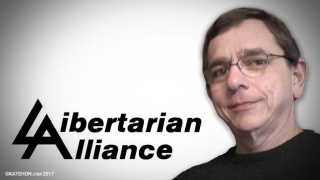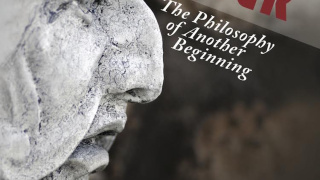Why Libertarians and Traditionalists are Natural Allies
In this article, I will identify the reasons why it is essential to build a solid alliance between libertarians and traditionalists.[1] As a libertarian, it appears to me that it is now of utmost importance to insist on a strict separation between libertarianism and various ideologies that are increasingly plaguing the libertarian movement. Indeed, when one notices the feminist, queer, relativistic, and hippie excesses characterising the cultural leftist turn of the libertarian movement, one realises that it is not without utility to remind libertarians of some traditionalist implications of an application of the libertarian doctrine to Western societies. It is also appropriate to remind traditionalists that the State is not a good tool in order to implement and maintain a traditional social order. Although few libertarians, to my knowledge, have formulated such analyses in French, it is important to indicate that the ideas that follow have already been expressed in English by various writers. Given the current state of the libertarian movement, however, restating these ideas is not, I believe, a useless endeavour.
II. On Libertarianism
Libertarianism is the only political doctrine allowing for a universal avoidance or resolution of conflicts among actors. Indeed, as Hans-Hermann Hoppe demonstrates, any conflict is ultimately reducible to a conflict concerning the use of scarce resources (i.e., there is a conflict only when multiple actors wish to simultaneously use the same scarce resource for incompatible purposes).[2] A libertarian recognises that only a social system based on private property (i.e., in which the exclusive right every individual has on his body and on every resource he was the first to acquire or to produce from nature, or that he received from a voluntary exchange with the first appropriator, is recognised, respected, and protected) can allow a universal avoidance or resolution of conflicts. Indeed, resolving a conflict then becomes relatively easy: it suffices that we find out who has the most ancient claim of the right to control a disputed resource. Far from being arbitrary, the libertarian solution is incontestably the only justifiable solution.[3] As should be clear by now, private property constitutes, as it were, the soul of libertarian theory.
In other words, one could define a libertarian as someone who understands that aggression (i.e., the initiationof force on an individual or on his property without his explicit consent) is never justified or justifiable. In particular, a libertarian recognises that the State—which is nothing but a set of parasitic institutions that are inherently aggressive—is never justified or justifiable.[4] Every individual is free to do as he pleases with his body and his legitimately acquired goods insofar as, by doing so, he does not infringe on the physical integrity of anyone else’s legitimately acquired property. This principle is generally called the “nonaggression principle.”
A few basic propositions follow from what has just been said:
- It is clear that the nonaggression principle implies the absolute right for any individual or group of individuals to associate with others in order to have economic, social, familial, or sexual relationships. It is never justified to initiate force on an individual to stop him from associating with others on his private property. (Let us note that libertarians who ally with the cultural Left typically stop their analysis of the implications of libertarian theory here, and thus base their relativistic utopia on the alleged extreme tolerance this implication seems to encourage. We will immediately see that this is nothing but an illusion.)
- It also follows from the nonaggression principle that every individual or group of individuals has the absolute right to refuse to associate with others. In particular, an individual has the right to refuse to exchange with, accommodate, or help anyone that he deems to be a social nuisance or a bad influence for society. And this is true whether or not this judgement is based on politically correct beliefs.
- It is important to highlight a third implication: every property owner has the right to use force to make sure that any undesired individual quits his property. Such a trespasser is nothing but an aggressor and the property owner is thus merely exercising his right to defend his property against an invader, which is perfectly legitimate.
These three implications can be summarised as follows: every individual has the right to freely associate with others or freely dissociate from others on his property. A libertarian society will therefore be a society in which discrimination and intolerance are at least possible and, as we will immediately see, are unavoidable.
II. Basic Economic and Sociological Facts
Let us now consider a few basic economic and sociological facts that will be useful to continue our analysis. It has already been said that libertarianism implies the right to associate or dissociate. The purpose of the following remarks is to highlight how individuals tend to associate or dissociate.
- a) Human actors associate with those individuals who are expected to maintain or improve the (subjective) value of their property and exclude those who are expected to deteriorate it.[5] In the same manner that any voluntary economic exchange or relationship must be considered mutually beneficial ex ante to occur, any voluntary social exchange or relationship must be considered mutually beneficial to occur. Robinson Crusoe will accept to associate with Friday only if he expects this relationship will bring him some (social or economic) benefit, and vice versa. If both men do not share similar values and one of them considers the other as being both an economic parasite and a social nuisance, then in no way is it possible to see any kind of associative relationship emerge voluntarily between them. Each man will have his own criteria allowing him to decide if a relationship with the other (e.g., as business partners or as friends) constitutes a net benefit for him. Thus, if Friday wishes to maintain a social relationship with Crusoe, he must bring a net social benefit to Crusoe (and vice versa). In particular, Friday must conform to the fundamental values of Crusoe if he wishes to be a part of the Crusoe-Friday community (and vice versa). By generalising this principle to a larger scale, if an individual A wishes to join an already established community X, then he must conform to the fundamental values on which community X rests. Otherwise, once he moves in this community he will either be ostracised if there is no restrictive covenant requiring the respect of specific norms of conduct on his newly acquired home or excluded from the community if such a covenant exists and has not been respected by A.[6]
- b) Every human being is different. Every human being has been endowed with a different set of economic and social skills.[7] Some are smarter than others, some are stronger than others, and so forth. It is therefore usually in the interest of the weaker (physically, intellectually, or otherwise) members of a society to associate with the stronger members and to voluntarily submit themselves to their authority in order to improve their standards of living (or even simply to survive). It is also in the interest of the stronger members to associate with the weaker members of society (under the condition that the latter group accepts to submit to the former group’s authority) in order to divide labour and prosper even more than they could by only associating among themselves. However, as Hoppe points out, only the former (stronger) group can survive and prosper (although not as much) without the latter (weaker) group.[8]
When combining these socioeconomic remarks with the implications of libertarianism deduced in section I, it becomes quite clear that a libertarian society will necessarily be anti-egalitarian and will tend to be characterised by the existence of various communities, each one of them being internally homogeneous in terms of commonly shared fundamental values.[9] Indeed, the only justifiable way to have an egalitarian libertarian society would be that everyone accepts voluntarily not to discriminate, which goes against the most basic incentives of every property owner to preserve or improve the value of his property. (Even a radical egalitarian is incentivised to at least exclude anti-egalitarians from his property, thus creating paradoxically at least two distinct and unequal classes of individuals).
Libertarian societies, then, must be hierarchised. Not around democratic or autocratic criteria of course, but on a strictly voluntary basis—i.e., the ungifted, unintelligent, and weak will tend to accept the authority of the gifted, intelligent, and strong because it will often (if not always) be in their interest to do so in order to be employed, to rent an apartment, to live in a safe community, and so forth. Rebels and moral relativists will thus be generally marginalised, ostracised, or not tolerated at all if they pose any threat to the fundamental values on which the libertarian community is based.
In other words, building a sustainable egalitarian or relativistic libertarian society is impossible because individuals are unequal and need to share similar fundamental values in order to interact peacefully and associate with one another.
III. Traditionalism vs. Cultural Leftism
We are now at the crucial part of this analysis. Western traditionalists are generally individuals who value the sacred character of institutions such as the traditional family or the Church and that realise that Western civilisation and culture are the pillars of the economic prosperity and social improvement in Europe and North America. Traditionalists are in favour of the decentralisation of most (if not all) economic and social policies in order to give back to the parents the power to educate their children properly and to small communities the power to establish their own rules of conduct. They are generally in favour of free markets and of the absolute right to discriminate according to local criteria. They reject the idea that they should be forced to pay for the predictable consequences of the immoral behaviour of others. They reject the idea that their children should be indoctrinated by public schools where political correctness and the generalised tolerance of any lifestyle are taught as if they were sciences. They also reject the forced inclusion of a massive number of culturally incompatible immigrants. They promote the idea of a society that is locally hierarchised according to the economic, social, and moral abilities of everyone. In brief, they reject that anyone should force them to tolerate what they consider to be degrading or inferior lifestyles and are in favour of an anti-egalitarian social order constructed in such a way that everybody occupies a role corresponding to his natural abilities and virtues.
It goes without saying that such a worldview is likely to offend a cultural leftist. The exacerbated anti-egalitarianism of true traditionalists is certainly not fashionable nowadays. Yet none of what they promote is essentially incompatible with libertarian principles. On the contrary, they simply want to exercise their right to associate with—and even more so to dissociate from—whomever they want. They merely want to exercise their right to live and educate their children according to their own values. In other words, they want to be left alone.
This is why I call for a “libertarian-traditionalist” alliance in Québec and in Canada (as well as anywhere else in the West). As the English libertarian writer Sean Gabb argued, traditionalists and libertarians are, at least for now, “natural allies against a ruling class that is at war with both liberty and tradition.[10]” Few sentences have succeeded to encapsulate the reality of our time as well as this one. Western States are less and less at war against the victimless sins or vices of the cultural Left such as drug abuse, the practice of homosexuality, or the sexual liberation of women. However, Western States are increasingly at war against those wishing to pursue a traditional lifestyle. The reason for this is simple: the more a society becomes culturally egalitarian, the easier it is for such a society to generally accept the liberticide measures that its ruling class wishes to impose.
In light of all this, it becomes clear that the contemporary libertarian movement has decided to inflict an overdose of egalitarianism upon itself by condemning traditionalism. There is nothing wrong about tradition per se from a libertarian point of view. But by allying themselves with groups from the feminist, queer, relativistic, and hippie Left, libertarians have become the allies of statism. Indeed, the cultural Left is no longer (if it ever even were) libertarian; it does not advocate merely for the criminalisation of true rape, the decriminalisation of homosexual practices, or the decriminalisation of drug use, but rather for the criminalisation of any action deemed to be part of “rape culture” (an absurd concept according to which even a slightly inappropriate comment about a woman would encourage rape or according to which not recognising that a woman who regrets a sexual intercourse would de facto have been raped encourages rape), criminalise homophobia or intolerance, and publicly finance abortions, sex changes, or injection centres for heroin addicts.
The cultural Left is an objective enemy of liberty and the State is an objective enemy of tradition. On the one hand, it is by ensuring the good health of traditional Western institutions such as the traditional family, Christian religion, and free markets that libertarians will be able to fight the State efficiently. Indeed, these institutions are based on the recognition of natural hierarchies that are susceptible to become efficient counter-powers to the State. On the other hand, it is only by fighting the State that traditionalists will be able to establish and maintain a stable traditional social order. As mentioned in section II, a libertarian society will be largely traditionalist (although, to state the obvious, specific traditions will vary from place to place). In other words, communities will be largely heterogeneous from one another, but will also be highly homogeneous internally in terms of the common fundamental values. This would constitute a perfect context to establish a community which corresponds exactly to a traditional social order.
In light of this, let us push the libertarian movement in the Right direction and the traditionalists on the path of Liberty.
Notes
[1] Many Anglophone authors have already insisted on the importance of building such an alliance. See for instance Keir Martland, “Paleolibertarianism” in idem, Political and Cultural Essays (2016). See also idem, “Not Thick or Thin, Just Grown Up Libertarianism” in Ibid.
[2] Hans-Hermann Hoppe, The Great Fiction – Property, Economy, Society, and the Politics of Decline (Laissez Faire Books, 2012), pp. 85-87.
[3] See Murray N. Rothbard, The Ethics of Liberty (New York and London: New York University Press, 2002), chap. 8; Hans-Hermann Hoppe, The Economics and Ethics of Private Property (Auburn, Alabama: Ludwig von Mises Institute, 2006), chap. 11-15; idem, A Theory of Socialism and Capitalism (Auburn, Alabama: Ludwig von Mises Institute, 2010), chap. 7. See also N. Stephan Kinsella, “What Libertarianism Is.” In idem and J. G. Hülsmann (eds.), Property, Freedom, and Society: Essays in Honor of Hans-Hermann Hoppe (Auburn: Ludwig von Mises Institute, 2009).
[4] Note that I describe libertarianism in its pure form. Some libertarians only accept to a smaller extent the fundamental principles that I exposed here. There exist libertarian minarchists, for instance, who believe that the State is legitimate insofar as it remains relatively small. Whether or not this is a sensible position is another question.
[5] Here’s a simple example: parents valuing a good education for their children are incentivised to associate with virtuous people and, as a consequence, to exclude from their house—and to refuse to associate with—junkies, sexually deranged individuals, or any other type of individuals that compromises the good education they value for their children. They will therefore be incentivised to live in a proper neighbourhood in which security and good values are guaranteed. Otherwise, the value of their home would diminish since it would no longer be a proper place for the accomplishment of their goals.
[6] See Murray N. Rothbard, Ibid., p. 146; Hans-Hermann Hoppe, Democracy – The God That Failed (New Brunswick, N.J.: Transaction Publishers, 2001), chap. 10.
[7] On this subject, see Murray N. Rothbard, “Egalitarianism as a Revolt Against Nature” in idem, Egalitarianism as a Revolt Against Nature and Other Essays (Auburn, Alabama: The Ludwig von Mises Institute, 2000 [1974]).
[8] See Hans-Hermann Hoppe, A Realistic Libertarianism (lewrockwell.com, 2014).
[9] See on this subject Hans-Hermann Hoppe, Democracy – The God That Failed.
[10] Sean Gabb, Cultural Revolution, Culture War: How Conservatives Lost England, and How to Get It Back(London: Hampden Press, 2014) Kindle edition, chap. 6.












